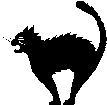|
Aussie Animals as Pets? -
out with Puss and in with Poss!
Thursday, November 18, 1999
Australian Museum, Williman Street Entrance, Sydney
Entry by ticket only.
Science in the Pub (TM) is a remarkably
successful initiative of the Australian Science Communicators (NSW).
It has proved to be a great forum for cutting-edge debate in a genial
pub atmosphere with leading Australian scientists. Tonight it joins
TAMS to present for a one-off session at the Australian Museum with
scientists, Professor Mike Archer, Director of the Australian Museum
and Dr Paul Hopwood, from the Department of Veterinary Anatomy &
Pathology at the University of Sydney. Wine sharpens intellects and
loosens tongues, but the only arguments here will be rational ones.
This evening’s topic is likely to be more than usually controversial–it
is a subject that divides people passionately. There are at least three
positions: one, that we should keep native and domestic animals as pets;
two, that we should only keep native animals as pets; and three, that
we should keep no animals at all. Come and hear Mike and Paul, and be
ready with your questions and your own opinions.
Paul Hopwood is a veterinary anatomist
in the faculty of Veterinary Science at the University of Sydney. A
life long interest in native fauna lead to a PhD in 1976 on the anatomy
of kangaroos and a postdoctoral monograph in 1980 on the kangaroo lymphatic
system. Convinced that the long-term future of many native mammal species
can be assured through sustainable commercial utilisation his research
focus has been on kangaroos as game meat animals. More recently he has
been researching the pet potential of rare and endangered native mammals.
The concept is to allow rare and endangered
mammals to colonise urban habitat as pets. Animals would be sourced
from commercial breeding colonies supported by the profit made from
breeding and selling the animals. In effect part of the $2 billion pet
industry annual turnover would be diverted from dogs, cats, tropical
fish etcetera to other alternative species, that is, endangered native
mammals.
The up side to this proposal would be
the establishment of large breeding colonies of endangered mammals that
were suitable for sale to the pet trade. Obvious benefits would be the
presence of the buffer commercial breeding populations as insurance
against extinction in the wild, as a source of animals for reintroduction
to the wild and as a source of animals for study and research. An additional
major benefit would be the pleasure and bonding that the pet owners
gain from their charges. This would enhance the political base for meaningful
conservation initiatives for the wild population.
Mike Archer, who was born in Sydney
in 1945, is a dual citizen of Australia and the USA. His career in vertebrate
palaeontology began when he was 11 and proceeded with undergraduate
training in geology and biology at Princeton University and gained consecutive
Fulbright Scholarships for palaeontological research in the Western
Australian Museum, Perth (1967-69). He gained his PhD in Zoology from
the University of Western Australia (1976). From 1972-78, as Curator
of Mammals at the Queensland Museum, he spent equal amounts of time
on vertebrate palaeontology and modern mammalogy, producing books and
many research papers.. Increased Riversleigh work saw the need for a
much larger ‘army’ of co-researchers and resulted in a shift
(1978) to the UNSW, where he has been Professor of Biological Science
since 1989. In 1999 he became the Director of the Australian Museum
in Sydney while maintaining a formal professorial appointment at UNSW.
He has received numerous awards for
his research, including the Inaugural Eureka Prize for the Promotion
of Science 1990, and the Clarke Medal of the Royal Society of NSW, 1984
for Researches in Natural Science.
Throughout his career he has encouraged
and fostered public education and involvement. His work in Riversleigh
has seen the formation of the Riversleigh Society Inc and its quarterly
publications in Australian prehistory. He has a large following of dedicated
volunteers drawn from members of the public, who work on numerous initiatives
that have grown from the Riversleigh project.

From Paul ……
All things bright and European,
All cats and dogs be seen.
No things marsupial,
Ever to be preened.
All things tamed, historical,
Imported one and all.
Nothing God made locally,
Australians rate at all.
All things bright, nocturnal,
A mystery to us all.

Nothing Antipodean,
Ever held in thrall.

Now’s the time to ponder,
And befriend them all.

… and from Mike …
There once was a man with new thoughts
About keeping pets of all sorts
Instead of a cat, he'd rather a bat
Or a quoll from a shop to be bought.

Science in the Pub™ is an initiative
of the Australian Science Communicators (NSW). Regular sessions
are staged from 7.00—9.00 pm on the last Wednesday of the month
(Feb — Nov) at the Harlequin Inn (formerly Duke of Edinburgh),
152 Harris Street, Pyrmont in Sydney. Sessions are also staged around
Australia by invitation from various organisations.
Future Science in the Pub sessions
(see the website for full details)
Wednesday, 24 November: The Age of the
Universe with astronomers Charley Lineweaver (UNSW) and Dr. Brian Schmidt
(MSSSO). (Last of the Science in the Pub 1999 regular Sydney sessions)
Wednesday, 15 December: ASC NSW Christmas
Party at The Pub in Pyrmont.
All welcome! ASC members, $10; non-members, $15. For details contact
Robyn Stutchbury (see below).

'Science in the Pub'(TM) is
an initiative of the Australian Science Communicators (NSW) and supported
by the Australian Broadcasting Commission.
SciPub has received two grants from
the Science and Technology Awareness Program (an initiative of the Department
of Industry, Science, Tourism), the most recent of which will be used
for presenting Science in Your Pub during National Science Week 1999
in Canberra, Sydney and Melbourne.
|